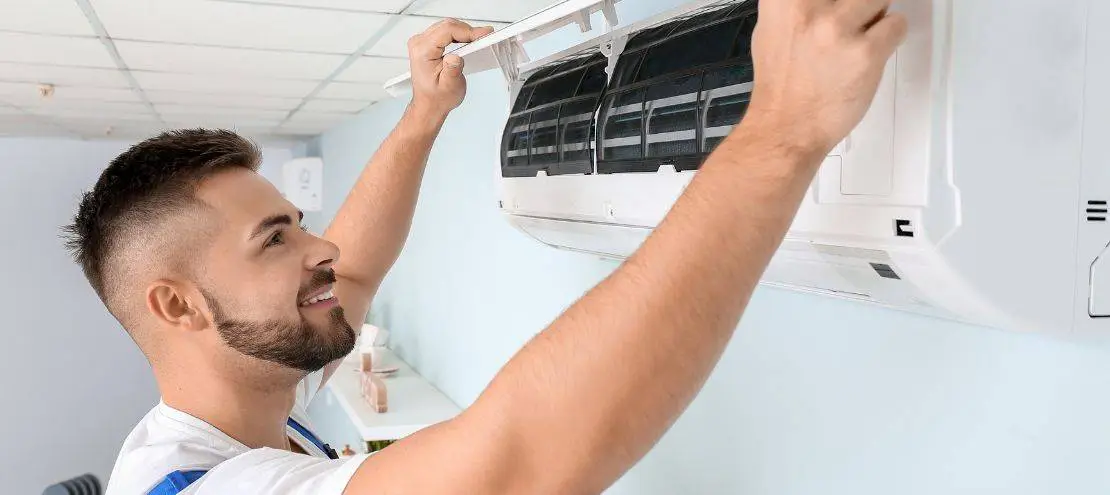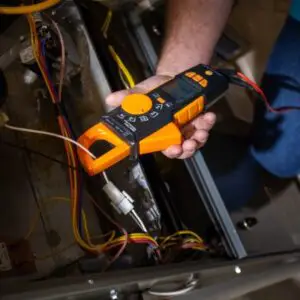Everything A Homeowner Could Want To Know About HVAC Maintenance
As the temperatures rise, everyone is clicking on their air conditioner to stay cool during the warm afternoons. Most of us want to take good care of our home but may not know how to take the best care of a home’s biggest appliance—its HVAC system.
Would it surprise you to learn that your HVAC system expends as much as half of a home’s energy requirements? This is why it is so important to give your central air and heating system some tender loving care.
Benefits of HVAC Maintenance
Routine maintenance on your central air and heating system should ideally be scheduled twice a year—once in the fall before the winter and once in the spring before the summer.

Licensed HVAC Technician and Terry’s A/C & Heating Owner Rob Terry explains why: “HVAC breakdowns rarely happen at a convenient time. The best way to reduce the chances of a surprise HVAC system breakdown is to prioritize HVAC maintenance.”
Taking care of your HVAC system has many benefits:
- Regular service on your HVAC system can lengthen your HVAC system’s lifespan.
- It can keep your system running more efficiently, saving money on your utility bill.
- Maintenance can spot smaller repairs before they create larger issues.
- Regular service can identify health and safety concerns.
- Evidence of regular maintenance can preserve the warranty on your HVAC system.
Some maintenance tasks are simple for any homeowner to accomplish, though some are better left to the experts.
Maintenance Tasks for Homeowners
Here are some of the ways you can keep up on your HVAC maintenance.
Keep the Air Filters Clean
Probably the best thing you can do to maintain your central air or heat pump is to replace the air filters regularly. Advice varies, but shoot for a minimum of changing them each time the seasons change, more often if you have pets.
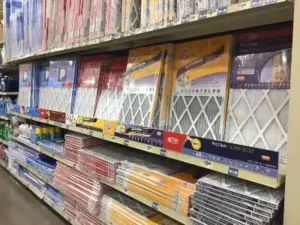
Terry says, “A clogged air filter, such as one that has not been replaced for a long time – even just one year – can make HVAC motors work harder and wear out sooner. Over time, this can cause the unit to fail sooner than it would have normally.”
Air filters can be located in the return air vents or your furnace. If you’re not sure, ask a technician on your next visit.
Time and Cost-saving Tip: Order your filters for the entire year all at once. Then, set a reminder on your phone’s calendar so you always have a supply of air filters ready when you need them.
Trim Vegetation to Reduce Pest Infestation
Pests of many types can inflict unexpected damage on your HVAC system and your home. You can do this yourself or hire a professional to help you ensure your home is less interesting to insects and other pests.
Squirrels, mice and other critters can tear up ductwork if they get into your attic. If you have a lot of vegetation near your outdoor unit, critters can and do get in there, too.
Trimming trees and bushes off the home and making sure your outdoor unit is not covered with vines or vegetation is a good idea. Terry advises to look before you cut so you don’t end up trimming needed wires.
Check Your Smoke and Carbon Monoxide Detectors
According to the United States Environmental Protection Agency, smoke and carbon monoxide detectors are inexpensive safety devices every home should have throughout the house.
While HVAC systems of every brand include many safety features, having working smoke alarms and carbon monoxide detectors are two easy ways to keep a home’s occupants safe.
These devices should be tested regularly to avoid the telltale middle-of-the-night self-check chirps. And, don’t forget to replace the batteries.
Maintain the HVAC Condensate Drain

If humidity is a problem where you live, regular maintenance of your home’s condensate drain is a smart idea. Twice a year, in the spring and the fall, pour a half-cup of vinegar down the drain to keep it in good shape and avoid blockages caused by algae and slime. Terry doesn’t recommend using bleach because it reacts to metals, such as zinc, aluminum and copper, and can cause pinhole leaks in galvanized drain pans over time.
Condensate drains are located indoors next to the evaporator coil. It could be in an attic, basement, hallway or garage closet. You’re looking for an exposed drain that directs humidity removed from the air to the outdoors.
In newer construction, Terry says condensate drains can be tied into a home’s plumbing system, so you might not see an exposed drain. You can always check the drain pan. If the drain pan is wet, you may have a drain that should be cleared.
In dryer areas, you may have a whole home humidifier. If that’s the case, you will need to check the owner’s manual for which parts should be replaced.
The right amount of humidity makes the indoor environment more comfortable, but not enough can cause mold to build up. This can cause unpleasant smells and health problems.
HVAC Maintenance Tasks for Licensed Technicians
Licensed HVAC technicians will be checking your system from top to bottom. Generally, they focus on air conditioning in the spring and your heater, boiler or furnace in the fall.
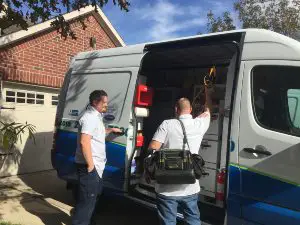
It might surprise you to learn that testing an air conditioner during the winter or when it’s very cold can be counterproductive. It can also damage your compressor. So do your planning now to avoid a headache later on.
General Maintenance Tasks at Each Tune-Up
Here’s what your HVAC technician will be looking at with each tune-up.
Check the Thermostat
A technician will use your thermostat to make sure it is working properly. If you have a smart thermostat, they can clear any error codes. They can also help you program the thermostat.
Monitor Airflow and Air Filters
Are your air filters clogged and require replacement? Are there very hot or much cooler spots in the home? Is there good air intake through return vents and good outflow through the supply vents in each room of the home? Are the registers, which cover the vents and control airflow with an adjustable damper, positioned correctly?
These are some of the questions a technician will be able to address. They may also recommend courses of action to remedy any issues uncovered in the tune-up.
Inspect Blower Motor and Other Electrical Parts
Blower motors and fan motors keep the air circulating and also keep the refrigeration process going. HVAC technicians will check for electrical problems that can short circuit the system. Many systems have surge protectors to prevent damage from spikes in power. If they don’t, you can always ask that they install one.
Look at Your Air Purification System
If you have a whole home air purification system, UV lights or media filters, that system will be checked and consumable parts replaced. Air purifiers can improve indoor air quality.
Conduct Safety Checks
Technicians will look to make sure that surge protectors and float switches are operational and fail-safes are operating as expected. They will look at smoke alarms and carbon monoxide detectors and ensure they are in working order.
Check the Condensate Drain and Drip Pans
Homeowners can maintain these themselves, but they often leave them to HVAC technicians. Regular maintenance of drains, float switches and drain pans prevents damaging water leaks.
Evaluate Your HVAC System’s Condition
Is your system looking especially dirty? Are there charred or blackened wires that should be replaced? Are the fins on the condenser looking rusty? Is the indoor evaporator coil full of mildew? Is the ductwork insulated and in good condition? Is there any evidence of pest infestation that should be remedied? These questions and more help HVAC technicians evaluate your HVAC unit’s general working condition.
Maintenance Tasks Specific to Air Conditioning
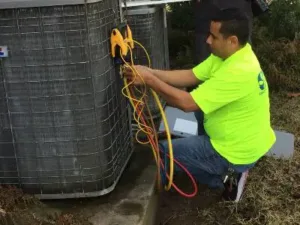 Inspect Refrigerant Levels
Inspect Refrigerant Levels
Specialized equipment and training are required to handle refrigerants safely. If your air conditioner or heat pump begins to leak refrigerant, it will need to be fixed and more refrigerant added to the system.
Leaks take the “horsepower” out of the refrigerant’s ability to absorb enough heat from the air and transfer it out of the home. Because of the way the refrigeration process works, not having enough refrigerant can cause your air conditioner to freeze up and fail. While too much refrigerant can upset the system’s balance, causing it to break down.
Assess the Condenser, Evaporator Coil, Electrical Components and Compressor
Whether you have a heat pump or a conventional cooling system, the refrigeration process works much the same. To operate efficiently, your HVAC system requires keeping refrigerant at high pressure. This makes it possible for the refrigerant to efficiently absorb heat from the air indoors and transfer it outdoors. In addition to inspecting these parts, your service might include cleaning the outdoor condenser.
HVAC Maintenance Tasks Specific to Heating
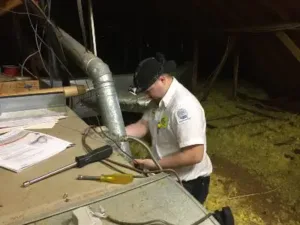 Check the Heating System’s Fuel Connections and Exhaust System
Check the Heating System’s Fuel Connections and Exhaust System
A majority of heating is accomplished with furnaces and heat pumps, which deliver warm air through ducts. These types of heaters are referred to as “forced air systems.”
Boilers are another option for distributing heat through pipes via water or steam. Because fuel must be used to create heat, the exhaust must be properly vented so noxious gasses do not build up in the home and malfunctions don’t cause the system to overheat.
Inspect the Heat Exchanger or Heat Strip
A technician will look at the heat exchanger in a fuel-fired furnace or boiler, which is the part that houses the combustion, and ensure it is operating correctly. They may simulate faults to check the safety systems. They will make sure the flame is burning efficiently, the exhaust isn’t leaking into the home and fuel is burned completely.
If there is a serious problem that cannot be fixed, a furnace may be disabled or red-tagged because it is unsafe to use. In most places, this is required, and you can get a second opinion.
For an electric heating system, they will inspect the heat strips, sequencers, relays and control boards to ensure they are working properly and safely.
Carbon monoxide and Smoke Alarms
Carbon monoxide and smoke alarms are especially important during the heating season because of the risk of carbon monoxide poisoning and fires.
What to Do If A Repair Is Required During A Maintenance Visit
Regular service on your HVAC system is essential to keep your system running smoothly. It can be frustrating to some homeowners when HVAC technicians spot problems. But, there’s another way to think about that situation.
Be Happy You Caught the Problem Early
Identifying a small electrical part that is on the edge of failure is a good outcome. It means you most certainly prevented an unexpected breakdown of your air conditioner or heater.
Fixing a small problem, like replacing a fan motor, means a failing part probably didn’t have time to wear out additional parts. This means you prevented a potential costlier problem in the long run.
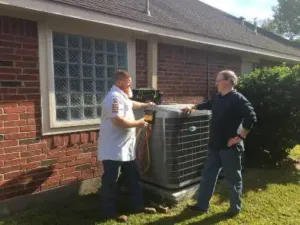 Ask Questions
Ask Questions
A licensed HVAC technician should be able to explain what is going on if they recommend a repair and answer your questions. They should also be able to show you the part that they are recommending be replaced.
Most air conditioners and heat pumps last on average 15 years, depending on how often you run them, how diligent you are with maintenance, and what the weather is like where you live.
You should be wary and consider a second opinion if your technician tells you to replace the unit without being able to answer your questions, is unable to show you the parts, and your unit is young enough to be under warranty.
If your system is older and less efficient, repairs are becoming more frequent, and the warranty has expired, it might make sense to consider a replacement. Even if your HVAC tune-up indicates that time might be drawing near for an air conditioner replacement, you’ll have time to weigh your options.
Is Your Part Covered Under a Manufacturer’s Warranty?
If a repair or replacement is recommended during your regular maintenance visit, be sure to ask if any of your parts are covered by a manufacturer’s warranty. While it may not cover the cost of labor, the manufacturer’s warranty can make a repair less costly for a homeowner.
Air conditioning and heating companies often file warranties on their customer’s behalf to make sure they receive additional benefits. Some include labor warranties with air conditioner installations so that warranty service is essentially at no out-of-pocket cost for a homeowner.
If you’re unsure, asking the question can typically save you some money in the long run.
HVAC Service Contracts Can Cover Regular Maintenance
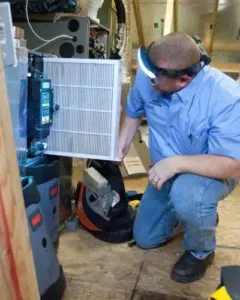
Maintenance of your air conditioner and heater will keep it running much longer and minimize breakdowns. But not everyone knows that scheduling these essential maintenance visits are one of the best ways to show your hardworking air conditioner and heater a little love.
HVAC companies offer scheduled maintenance plans or HVAC service contracts to their customers to make it easy to remember and prioritize. Each company might offer something a little different, so it pays to ask questions before signing a contract.
These scheduled maintenance plans may be prepaid and offer priority service. They can offer this guarantee because they know that well-maintained HVAC systems rarely fail.
If you are considering a service contract, these are some of the things that may be included:
- Labor to service your HVAC unit twice a year
- Minor parts and supplies such as lubricants, screws, tape and fuses
- Discounts on repairs and emergency service
- A checklist showing the systems checked and findings.
A scheduled maintenance plan can make sense if keeping your home comfortable is a top priority. It can give a homeowner more peace of mind, and it helps HVAC companies better plan for their services and reduce emergencies.
Finding the Right HVAC Partner
If you don’t already have an HVAC partner to service your home’s air conditioner and heater, there are a few questions you can ask to help you choose the right one.
Is Their License Current?
You may be able to check with your state’s department of licensing to verify this online.
 Can They Tell You About Their Training or Awards?
Can They Tell You About Their Training or Awards?
Some technicians are supervised by a licensed HVAC contractor. Some go the extra mile to receive additional certifications, such as the North American Technician Excellence certification. If they are a Factory-Authorized Dealer for any manufacturer, they will receive extra training.
How are their reviews? Do They Come Recommended by Neighbors, Friends or Family?
Online reviews can give you a sense of how they do with customer service. Pair what you learn with a grain of salt. Even if a company has a lot of five-star reviews, you will probably find a handful of customers who ranked them lower. Factor in recommendations from trusted neighbors, friends and family, too.
How do They Respond to Your Questions?
You can determine whether an HVAC company is a good match by how they answer your questions before, during and after a service call. Was the quote you received detailed? Can they tell you more about warranties and their workmanship? All in all, they should welcome your curiosity and be able to answer questions you have about your system and how it operates.
We have all had the experience of being at home with a broken air conditioner or heater. If you knew maintenance could nearly always prevent a repeat of that scenario, would you do it?
Learning more about steps you can take to keep your air conditioner and heater in good shape and how to find the right HVAC partner will help you and your family stay comfortable all year long.
This article was written by Amy Carr and was first published on ChatterSource.com. A writer for more than 25 years, Amy Carr is still learning something new about how to take care of her home. She’s an avid reader and relishes hikes with her husband, teen daughter and dog in the great outdoors. When she’s not advising clients, you’ll find her experimenting with a new recipe, digging in the garden and trying to convince the cat the dog was a good idea.
Image sources: Header image source Canva.com/pixelshot; All others from Terry’s A/C & Heating


 For
For  Call Us:
Call Us:  Text Us:
Text Us: 



